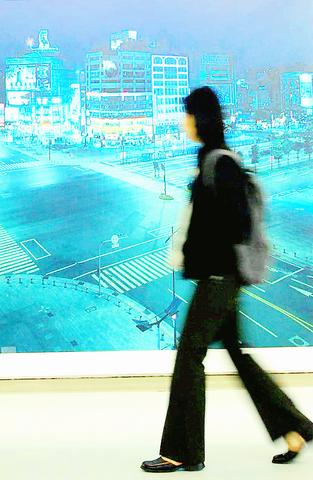If the Taipei Biennial ever had a political goal, it was the amicable diplomacy of art.
But this year the brand of cross-strait bickering usually reserved for government officials has intruded on an exhibition that since 1998 has put the Taipei Fine Arts Museum on contemporary art's international map.
The 2002 Taipei Biennial, curated by Bartomeu Mari of Spain and Taiwan's Jason Wang (

PHOTO: SEAN CHAO, TAIPEI TIMES
The opening, held last night, attracted critics and curators from Lyons to Beijing, who had all come to see an exhibition conscientiously designed around artifice, spectacle and the spaces in which people live and act. Its theme is "Great Theater of the World."
The behind-the-scenes intrigue comes from the dark world of politics.
The drama began in March at Brazil's Sao Paulo Biennial, where the Chinese government put pressure on organizers to remove the word "Taiwan" from Taiwan's national pavilion, making it the only one of around 70 national pavilions not designated by a country. The pavilion's entrance merely read "Taipei Fine Arts Museum."
In response, Taiwan's representative artist, Chang Chien-chi (
Chang, a photographer devoted to social issues that are more or less borderless, is not part of this year's biennial, but Wang Gong-hsin (
Word of Wang's presence broke yesterday in a Chinese-language newspaper, which raised the question of his involvement in the Sao Paulo incident.
Museum officials, Wang and the art world in general, denounced the allegation as ridiculous.
Wang, in fact, called the article "amusing," but refused to enter into any debate, saying that as an artist it was more suitable to remain in the province of art.
Taiwanese sources also defended Wang.
The co-curator of the 2000 Taipei Biennial, Manray Hsu (許文瑞), who was also in Sao Paulo, said of the censorship incident, "It had more to do with the [Chinese] government. They were the source of the pressure."
Museum director Huang Tsai-lang (
Even the beleaguered Chang said, "There's no proof of Wang's involvement."
Though the buzz of controversy was still building at last night's opening ceremony, but visiting artists were not impressed.
"The reason we have these exhibitions is to move away from these stupid boundaries and limitations," said Edwin Zwakman, an artist from the Netherlands.
"This is not a propaganda game for governments," he said.
For more information on the art work in the 2002 Biennial, see tomorrow's features page.

An essay competition jointly organized by a local writing society and a publisher affiliated with the Chinese Communist Party (CCP) might have contravened the Act Governing Relations Between the People of the Taiwan Area and the Mainland Area (臺灣地區與大陸地區人民關係條例), the Mainland Affairs Council (MAC) said on Thursday. “In this case, the partner organization is clearly an agency under the CCP’s Fujian Provincial Committee,” MAC Deputy Minister and spokesperson Liang Wen-chieh (梁文傑) said at a news briefing in Taipei. “It also involves bringing Taiwanese students to China with all-expenses-paid arrangements to attend award ceremonies and camps,” Liang said. Those two “characteristics” are typically sufficient

A magnitude 5.9 earthquake that struck about 33km off the coast of Hualien City was the "main shock" in a series of quakes in the area, with aftershocks expected over the next three days, the Central Weather Administration (CWA) said yesterday. Prior to the magnitude 5.9 quake shaking most of Taiwan at 6:53pm yesterday, six other earthquakes stronger than a magnitude of 4, starting with a magnitude 5.5 quake at 6:09pm, occurred in the area. CWA Seismological Center Director Wu Chien-fu (吳健富) confirmed that the quakes were all part of the same series and that the magnitude 5.5 temblor was

The brilliant blue waters, thick foliage and bucolic atmosphere on this seemingly idyllic archipelago deep in the Pacific Ocean belie the key role it now plays in a titanic geopolitical struggle. Palau is again on the front line as China, and the US and its allies prepare their forces in an intensifying contest for control over the Asia-Pacific region. The democratic nation of just 17,000 people hosts US-controlled airstrips and soon-to-be-completed radar installations that the US military describes as “critical” to monitoring vast swathes of water and airspace. It is also a key piece of the second island chain, a string of

The Central Weather Administration has issued a heat alert for southeastern Taiwan, warning of temperatures as high as 36°C today, while alerting some coastal areas of strong winds later in the day. Kaohsiung’s Neimen District (內門) and Pingtung County’s Neipu Township (內埔) are under an orange heat alert, which warns of temperatures as high as 36°C for three consecutive days, the CWA said, citing southwest winds. The heat would also extend to Tainan’s Nansi (楠西) and Yujing (玉井) districts, as well as Pingtung’s Gaoshu (高樹), Yanpu (鹽埔) and Majia (瑪家) townships, it said, forecasting highs of up to 36°C in those areas